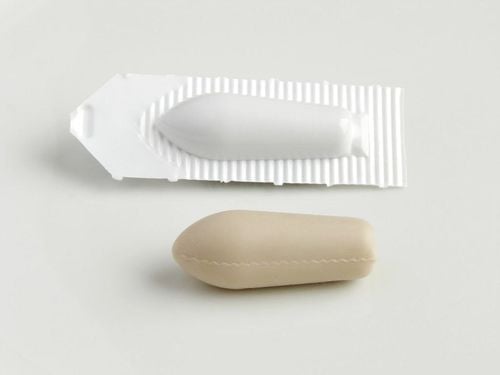Pariet is used to treat various peptic ulcer diseases. This article provides some information related to Pariet 20mg.
1. What is Pariet 20mg?
Pariet, or Rabeprazole, inhibits the secretion of gastric acid in both basal and stimulated states by inhibiting the H+/K+-ATPase enzyme in the parietal cells of the gastric mucosa.
In cells with a system of pumping ions on the cell membrane, hydrogen or proton molecules in the parietal cells are pumped into the stomach, reducing the pH and creating an acidic environment in the stomach. Rabeprazole acts on this enzyme to reduce gastric acid secretion and is therefore considered a proton pump inhibitor.
The mechanism of rabeprazole is to bind to these enzymes to inhibit the final stage of gastric acid secretion.
2. What is Pariet indicated for?
The main indications of rabeprazole include gastric diseases such as:
- Acute peptic ulcer
- Zollinger-Ellison syndrome
- Treatment of acute duodenal ulcer (duration of about 4 weeks)
- Gastroesophageal reflux disease with or without esophagitis, ulcerative or erosive lesions
In addition, Pariet can be combined with appropriate antibiotic regimens to eradicate H. pylori in patients with duodenal ulcers.
Pariet (rabeprazole) is contraindicated in patients with a history of allergy to rabeprazole or other benzimidazole derivatives (including lansoprazole, pantoprazole, omeprazole) or those who have allergic reactions to any component of the drug. Note that Pariet (rabeprazole) should not be used in pregnant women.
4. Administration/dosage of Pariet
4.1. Administration
The drug is produced in tablet form, so when using it, it should be swallowed whole, not chewed, crushed or broken. For best results, take the medication at least 30 minutes before a meal.
4.2. Dosage
The dosage will be prescribed according to the doctor's instructions and will usually be divided according to the disease.
- Patients with acute duodenal ulcers can use 20 mg/time/day in the morning. Patients can use it for 4 weeks if the ulcer has not healed completely.
- Benign acute gastric ulcer use at a dose of 20 mg/time/day for 6 weeks in the morning. If the ulcer is still unstable, it is necessary to continue using it for another 6 weeks.
- Gastroesophageal reflux disease with manifestations of ulcers or erosive lesions can use 20 mg/time/day for 4-8 weeks.
- For the treatment of symptomatic gastroesophageal reflux disease without symptoms of esophagitis, the recommended dose is 10 mg once daily for 4 weeks, then maintain 10 mg once daily if the condition does not improve. If the condition does not improve within 4 weeks, the patient needs to be re-examined by the doctor.
- Zollinger-Ellison syndrome is recommended to use a starting dose of 60 mg/time/day, a maximum dose of 120 mg/day, divided into 2 doses per day depending on the severity in each patient. The doctor may prescribe a once-daily dose if the dosage is below 100 mg.
- Duodenal ulcers and benign gastric ulcers caused by H. pylori infection will be treated according to the doctor's regimen when combined with antibiotics.
Please note that the above dosages are for reference only. Patients should follow the doctor's instructions and strictly adhere to the prescribed dosage.
5. Side effects of Pariet
The possible side effects of Pariet include:
- Chest pain
- Chills, fever
- Dry mouth, rash, belching, itching
- Flu-like symptoms, back pain, weakness,
- Diarrhea, unexplained abdominal pain, nausea, abdominal pain, constipation,
- Increased liver enzymes
- Restlessness, sleepiness
- Sore throat, runny nose, cough
- Urinary tract infection
- Muscle aches, cramps, joint pain
- Insomnia, headache, dizziness
6. Drug interactions with Pariet
The effects of Rabeprazole can affect some drugs such as:
- Erlotinib, nelfinavir, delavirdin, posaconazole
- Ketoconazole or itraconazole: can reduce absorption
- Methotrexate, saquinavir, voriconazole: increase effect/concentration.
- Atazanavir 300 mg/ ritonavir 100 mg: significantly reduces atazanavir concentration.
- Clopidogrel, dabigatran, etexilat, dasatinib, erlotinib, indinavir, iron salts, itraconazole, ketoconazole, mesalazine, mycophenolate, nelfinavir: decrease effect/concentration.
7. Precautions when using Pariet (rabeprazole)
Patients treated with rabeprazole for more than 1 year should be monitored regularly. This drug should not be used in children. In addition, the possibility of malignancy in patients should be ruled out before treatment.
Potential health problems that may occur when using this drug include:
- Blood dyscrasias: There have been reports of blood dyscrasias (decreased platelets and neutrophils). In most cases, the cause cannot be found, but these disorders are not serious and will resolve when dosing is discontinued.
- Liver enzymes: There have been reports of abnormal liver enzymes from clinical trials. However, if not caused by other causes, this disorder is not serious and will resolve when the drug is stopped.
- Liver failure: Extreme caution is necessary when prescribing rabeprazole sodium for the first time to patients with severe liver disease as there is insufficient clinical data.
- Gastrointestinal infection: Increased risk of gastrointestinal infection with Salmonella, Campylobacter, and Clostridium difficile when using the drug.
- Intolerance: Do not use rabeprazole in patients with hereditary galactose intolerance or glucose-galactose malabsorption.
- There is no evidence of the drug's safety for pregnant women.
- Contraindicated in breastfeeding mothers. It is unknown whether rabeprazole is excreted in breast milk. Therefore, the drug should not be used in this population because of the risk to children.
8. Management of Pariet (rabeprazole) overdose
Currently, there have been no reports of clinical signs or symptoms in cases of overdose. Therefore, there is no specific antidote in case of overdose.
Rabeprazole binds very strongly to proteins, so it cannot be eliminated by dialysis. In case of overdose, symptomatic and supportive treatment should be prioritized.
When missing a dose of Pariet (rabeprazole), you should take it as soon as you remember. If it is close to the next dose, skip the missed dose and take it as scheduled. Do not double the dose of rabeprazole as the effect will not increase, but the risk of side effects will.
9. How to store Pariet
- Store at a suitable temperature, preferably not exceeding 25°C
- Keep the drug out of the reach of children and pets
- Do not expose the drug to direct sunlight and damp places
- For expired drugs, you should discard them and not use them for treatment. However, you should ask your pharmacist how to dispose of expired drugs before disposing of them in the environment.
Pariet is a brand-name drug containing the active ingredient rabeprazole used in cases of acute peptic ulcer, gastroesophageal reflux disease, etc. Because the drug is a group of acid secretion inhibitors, long-term use can cause many side effects such as gastrointestinal infections, deficiencies of vitamins due to reduced absorption. Therefore, you should see a gastroenterologist for advice and support during treatment.
To arrange an appointment, please call HOTLINE or make your reservation directly HERE. You may also download the MyVinmec app to schedule appointments faster and manage your reservations more conveniently.








